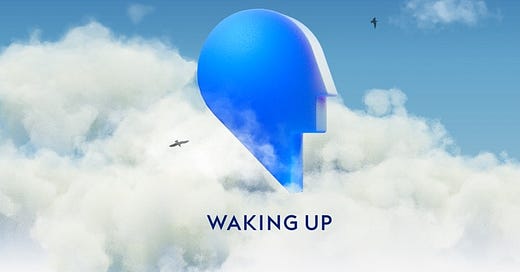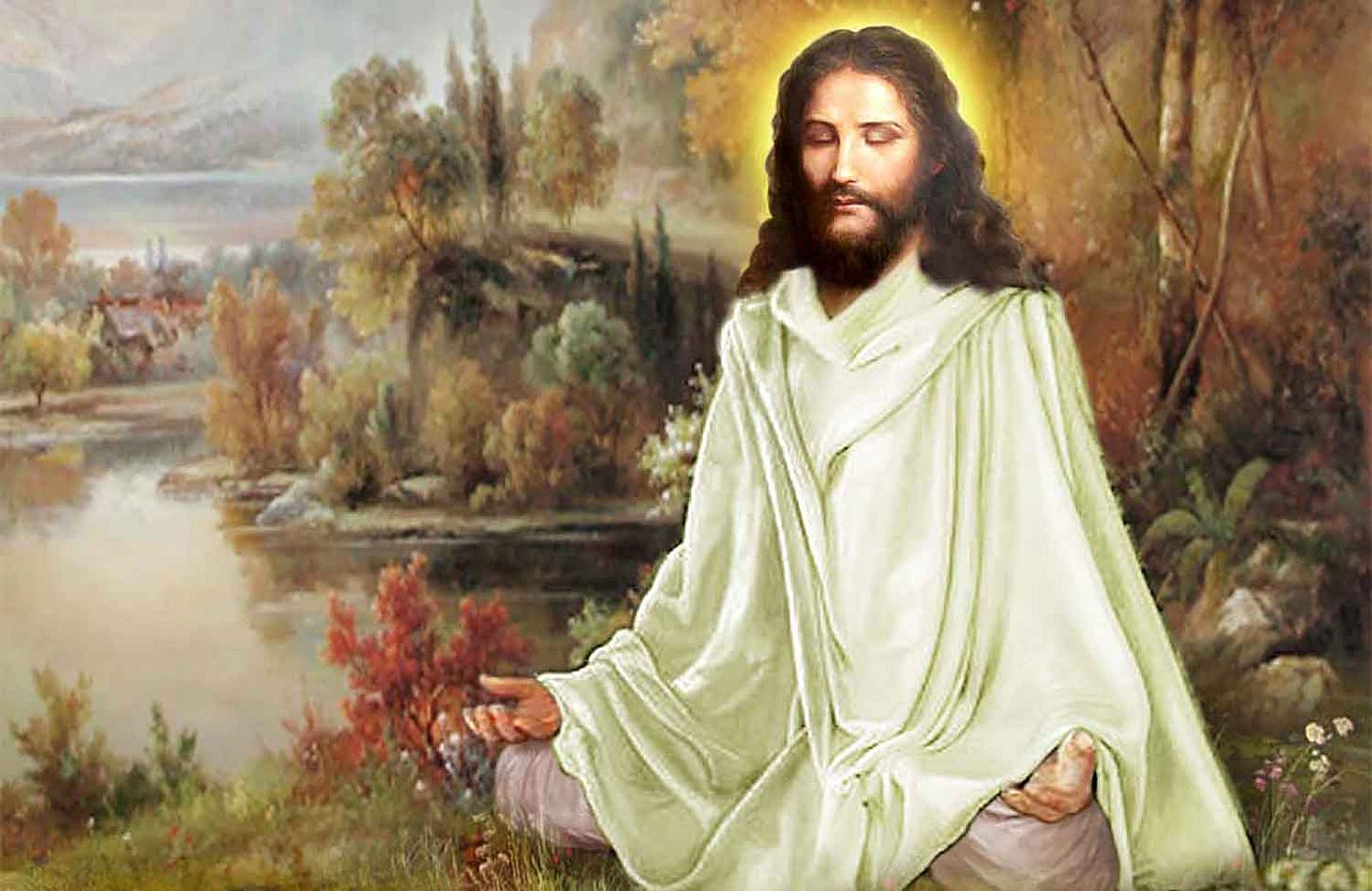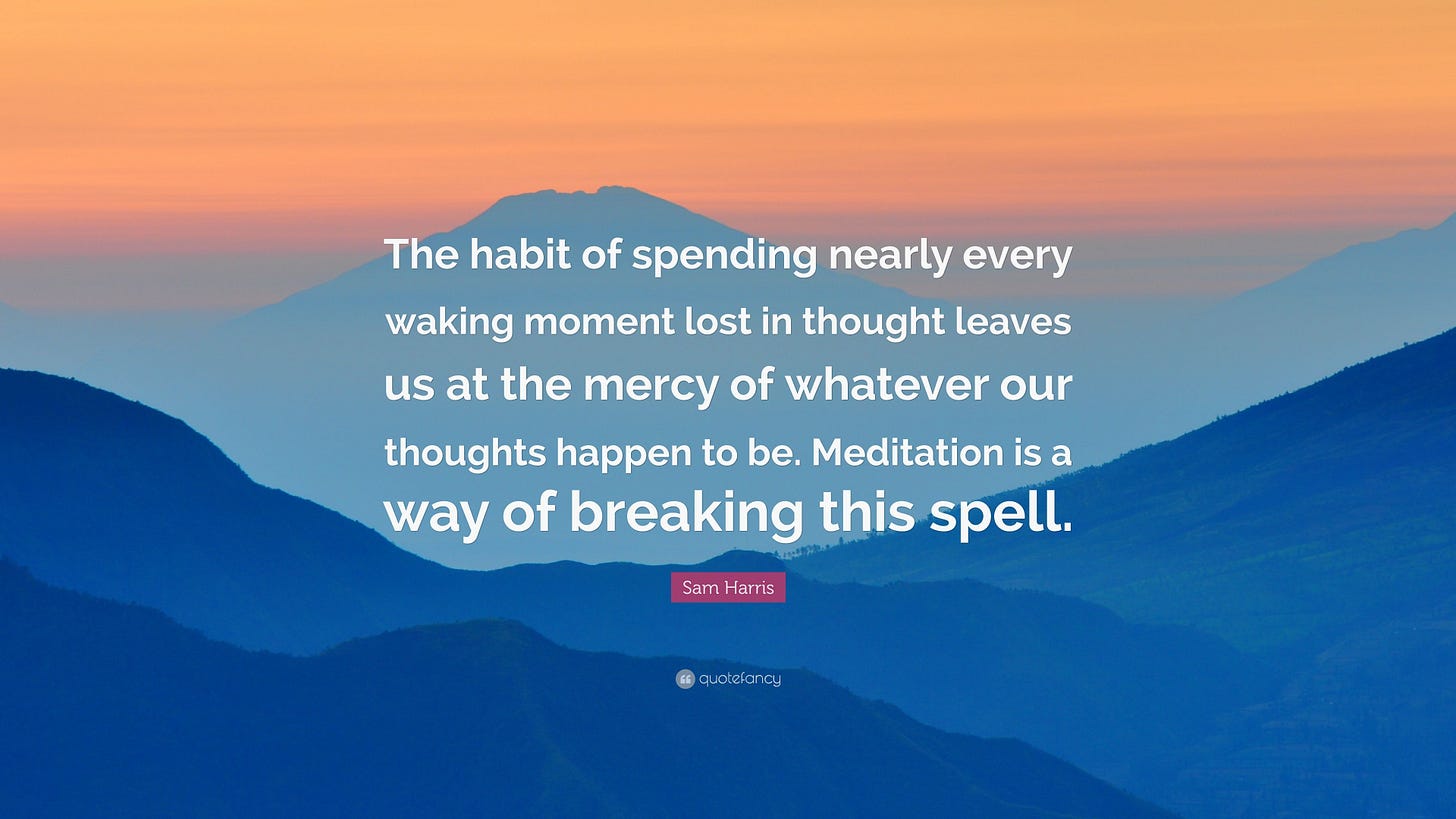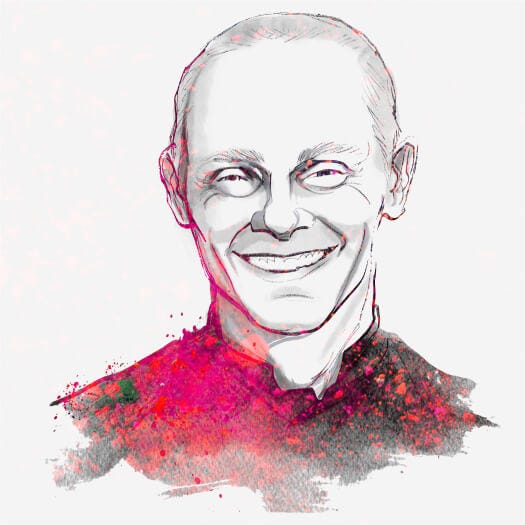Four Years of 'Waking Up': A Successful Experiment in Dogma-Free Spirituality
In the age of perpetual indulgence, Sam Harris' meditation library offers a universal antidote to mental suffering: transcendent, embracing awareness.
A short break from Big Pharma with an essay on matters of consciousness, psychological suffering, and spiritual crisis — another one of my passions. View my conversation with Sam Harris from last year here.
Late last month marked the four-year-anniversary of Waking Up — an exhaustive library of meditation teachings carefully curated by the “high priest of spirituality without religion,” Sam Harris. This "new operating system for your mind" is Harris' best attempt at distilling the profound insights from his ten-year adventure in South Asia, where he trained with the best teachers of the Buddhist and nondual Hindu traditions.
The revolutionary feature of Harris' library is it's transcendence of both secular materialism and religious dogmatism. Through the eyes of Western science, as demonstrated by apps such as Calm and Headspace, meditation is reduced to a goal-oriented technique of anxiety-relief or a transient experience of supreme relaxation.
Waking Up forces you to examine the nature of anxiety. What is "anxiety"? "Who" is feeling anxiety (or resisting it, rather)? "Who" wants an experience of supreme relaxation? What is the nature of this "want"?
The Waking Up teachings avoid any accompanying religious dogma that other meditation and yoga organizations maintain, but it opens up a truly rich, uncompromising path to living a spiritually fulfilling life. And that is its most impressive accomplishment — which makes the four-year-anniversary worth celebrating.
It doesn't water down, 'westernize', or naively romanticize the fundamental insights mystics across the centuries have universally realized (albeit in very different religious contexts, metaphysical terms, and languages). In my view, it offers the most lucid, accessible extraction of the foundation of all great religious traditions: ego-dissolution.
All great religions recognize and attempt to remedy the pathology of self that helplessly craves, recoils, fears, regrets, and clings. Ancient Christianity — with a thriving mystical core foreign to modern Protestantism (unlike Eastern Orthodoxy) — used Hesychast contemplative practice to attain inner silence and nondually merge with "divine light." This gradual process was used to dismantle the tyranny of self and experience the Kingdom of Heaven in the here and the now. In nondual Hinduism, God (Brahman) is described as "consciousness," "being," and "bliss." Advaitan philosopher Shankara invites us all to break from endless religious debates and theological discussions and directly experience the infinite — that which cannot be named or intellectualized — through nondual awareness.
Peculiarly, many of the followers of mainstream, organized Christianity and New-Age spirituality (often harboring surface-level understandings of oriental traditions such as Hinduism) have virtually no idea what St. Gregory Palmas, Meister Eckhart, or Shankara are talking about. When speaking to an evangelical Christian friend (whose father is a well-known pastor) struggling with crippling anxiety, I asked if he had tried meditation. He replied,
"No I haven't. I'm low-key afraid of what would happen if I go in that empty, silent space. I rather not see what's hiding in the shadows. Also, it sounds useless. Humans are supposed to think and analyze. Why stop?"
This was one of a few inter-faith dialogue occasions (which I increasingly find myself in) where I didn't bother further probing because this distant friend was operating from the very hostile, egoic mania that he has been unknowingly trying to break free from. Gaining a deeper understanding of the New Testament or helplessly praying to God from egocentric crisis is not primarily what those in his position need — though all those things can happily join the ride.
As I've come to realize, ideas of re-incarnation, heaven, the resurrection of Christ, past lives, and the law of karma are ultimately irrelevant to the sacred 'now.' It's not that religious doctrines and their consequential behaviors are trivial, but on their own (even accompanying the rare experiential "high" at a religious service) they are powerless in dispelling the stranglehold of the ego. And that should be the target, if any, of spiritual practice. Even if heaven or hell is our destined afterlife or everyone is re-incarnated in every birth, the perpetual crisis of ego-suffering is weighing on us in every moment.
Theology isn't good enough.
As Jordan Peterson and I converged on in our conversation, spirituality has been hollowed out in the West. The internal experience of ego death and resurrection is as foreign to Christians as it it is to secular atheists. On the other hand, "yoga" and "meditation" have been essentialized into popular flexibility-enhancing and stress-relieving techniques.
The truth is, everyone is an undergoing an internal crisis of contentment and joy. Some display this more openly than others (i.e., addicts, workaholics, ideologues, and the rest), but it is universal. The present moment is always lacking, never enjoyable enough. Never immersive enough. Never as sexy as we fantasize.
In attempts to fix this chronic disorder, we indefinitely postpone our well-being to the attainment of various life goals. If and when our hopes and dreams finally materialize, their mindful nectar evaporates with remarkable swiftness and we're right back where we started.
Most people are unknowingly trapped in this hornet's nest, like a primitive traveler swimming across the ocean in search for "water" (similar analogies abound in Buddhism). Had he known there's no place to look but right here, right now, his arduous mission would've been immediately resolved.
***
In my voracious spiritual explorations over the past two years, I have yet to come across a more accessible, rigorous, and uncompromised spiritual antidote to our timeless predicament than Harris' Waking Up corpus.
I still can't say I fully see the point or have been able to adopt the "new operating system" the teachings offer. For the wildly ambitious, creative visionary, it is a slow, gradual work in progress. However, I have strangely put my faith in the ego-transcendence mission of Waking Up because of the compelling, attractive case Sam has made.
The meditation series from teachers like Adyashanti and Jayasāra (whom I've most benefited from) have gradually helped open the doorway to ultimate, or at least for now, greater compassion, joy, contentment, and peace from mind in my life. With this piece slowly unfolding in my journey, other necessary components have emerged and blossomed, such as psychedelic exploration, inner child trauma therapy and a growing interest and appreciation for Advaitic Hinduism and mystical Christianity.
If I become a committed yogi or baptized Christian, it may be Sam’s fault (JK).
Many people I've recommended the Waking Up corpus to have attested to its benefits. My friend Parker, a second-year engineering student struggling with familial-religious expectations, told me of a newfound freedom he has glimpsed into:
Before finding Waking Up, I had no clue just how chaotic my mind was or the freedom I had to actually change my patterns of thinking. Sam helped me to realize that I do not have to identify with every thought that comes into my mind. There is nothing "intrinsically boring" about being alone with your thoughts and that boredom is actually a failure to pay attention. As someone who previously felt he had little control of his emotions, the skill of learning to be mindful has brought me significant relief. I cannot understate the value I have experienced in being able to choose whether or not I want to continue feeling negative emotions.
Another one of my friends, Jenn, tremendously benefited from Sam's guidance on the illusory nature of suffering caused by the most intense physical pain. Jenn wasn’t alluding to migraines, but giving birth to her second child:
I found the “working with pain” meditation really helpful. I used it before and during giving birth. I've benefited a lot from the idea that even pain is just a sensation and when we get to the point that we feel that pain is unbearable. What we are really doing is worrying about the next moment - about the pain to come. I think this idea is so helpful because it’s encouraging to think that when you can’t go another moment feeling this way you’ve actually just gone another moment feeling this way!
When giving birth, I was able to shift my perspective on the sensation of contractions by welcoming it as this is me getting closer to meeting my baby and I can trust my body that it knows what it’s doing. I just have to embrace the sensation, which Sam instructs the listener to “look closer“ at. As a result, I got through contractions way better this birth. I was talking in between them even joking a little with Joe [husband]. Last time I couldn’t talk at all, hardly present and totally captured by the scariness of the pain. I would describe it as squirming under the pain where as this time I felt like I was using my breath to work with the contraction to help move the baby down. Kind of like how you would focus on lifting a really heavy weight.
In the most painful of circumstances, Waking Up has helped revealed the intrinsic nature of consciousness. This anecdote illustrates the universality of mindfulness practice. Jenn is a long-time evangelical Christian married to a youth pastor. Unsurprisingly, she would vehemently disagree with Harris on faith and God. Those two worlds couldn't be farther apart. But those two worlds operate in the same galaxy, faced with the same psychological and spiritual crises.
Why not recognize the timeless, pure spaciousness that encompasses all these strikingly incompatible worldviews on politics, religion, science, and free will?
Human thought is the basis for everything — good and bad.
Changing our relationship to it may be the most sacred mission of our inner lives.
That is the best lesson I have acquired from Waking Up.
Join Waking Up for free and attend the first-ever (half-day) virtual retreat on November 5th. 9 AM — 3:30 PM PST:
My favorite series:
Meditations for Awakening
https://app.wakingup.com/practice/meditations-for-awakening
Recognition
https://app.wakingup.com/practice/recognition
Compassionate Awareness








The Bhagavad Gits states that one should abandon all religion and just surrender to God. What do you think about the mind of God? When I think about the complexity of DNA and the fact that so much of our body is coded information, it makes me think that there is a great Thinker. I mean codes on any scale don't happen by accident but this is a huge scale. There must have been thinking involved?
Have you heard of Yazhi Swaru? She is an extraterrestrial who has contacts on earth. One of her contacts, a girl named Gosia, has translated her articles and reads them on YouTube on the platform called Cosmic Agency. She explains everything about the nature of reality, the falsity of earth science, outlines the mathematics that connects everything through vibration, gives us free energy, explains with ether is, the nature of reincarnation… the list if her disclosure is very long. I advise you have a look at some topics that might interest you, or just start from the beginning of their correspondence. I just save them to my Brave playlist and listen to them offline in the car. I would love to hear what your beautiful mind has to say about this disclosure given to us to “wake us up.” I’ll check out this app too. Thanks for sharing it. https://youtu.be/y5q9uOc093A?list=PLE_kWXZhJBbSNE-80ho7siES6U6o85_ms
If you go to playlists: the playlist right at the bottom of the list is the entire communication from start to finish.